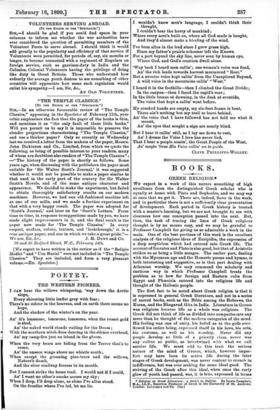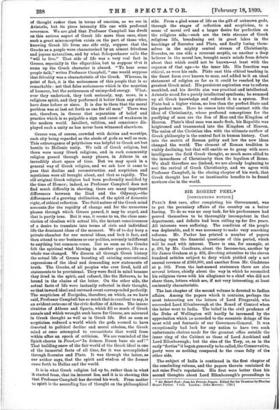BOOKS.
GREEK RELIGION.•
WE expect in a work of this nature something of high excellence from the distinguished Greek scholar who is equally at home with Plato and Sophocles, and we may say at once that we get it. There are, indeed, flaws in the work, and in particular there is not a sufficiently clear presentation of development. Each period in Greek history is treated with a master's learning, but we are not brought to see with clearness how one conception passed into the next. But, then, the task of tracing the lines of Greek religious thought is by no means easy, and we may be grateful to Professor Campbell for giving us so admirable a work in the main. One of the best portions of this work is the excellent analysis of the religions ideas of Euripides, the expression of a deep scepticism which had entered into Greek life. The account of Socrates and Plato is also good, but that of Aristotle strikes us as being a little meagre. The earlier part, dealing with the Mycenean age and the Homeric poems and hymns, is both interesting and suggestive, as is that part dealing with Athenian worship. We may commend the scholarly and cautious way in which Professor Campbell treats the problem as to how far foreign and Eastern cults from Egypt and Phoenicia entered into the religions life and thought of the Hellenic people.
The first fact to be noted about Greek religion is that it is expressed in general Greek literature, and not in a series of sacred books, such as the Bible among the Hebrews, the Koran, and the Bhagavad Gita in India. Literature in Greece was religious because life as a whole was religions. The Greek did not think of life as divided into compartments any more than he thought of the modern categories of the mind. His feeling was one of unity, his belief as to the gods over- flowed his entire being, expressed itself in his laws, his arts, his customs, as well as his worship. Never did any people develop so little of a priestly class, never was any cultus so public, so intertwined with what we call secular life. We must add to this trait the serious nature of the mind of Greece, which, however imper- fect may have been its active life during the later stages of Greek development, was never content to crouch in indifference, but was ever seeking for some ideal good. The striving of the Greek after this ideal, when once the early glow of youth had passed, was, it is true, expressed in terms • Religion in Greek Literature : a Sketch in Outline. By Lewis Campbell, M.A., LL.D., Emeritus Professor of Greek in the University of St. Andrews. London: Longman/ and 0o. [lbs.)
of thought metier than in terms of emotion, as we see in Aristotle, but its pious intensity fills one with profound reverence. We are glad that Professor Campbell has dwelt on this serious aspect of Greek life more than once, since such a great misconception exists on the part of those who, knowing Greek life from one side only, suppose that the Greeks as a people were characterised by an almost frivolous and joyous naturalism, and by what Schopenhauer calls the "will to live." That side of life was a very real fact in Greece, especially in the oligarchies, but to suppose that it sums np the Greek character is absurd. " To hear some people talk," writes Professor Campbell, "one would suppose that frivolity was a characteristic of the Greek. Whereas, in point of fact, it is the seriousness of this people that is so remarkable : not that false seriousness which is the negation of humour, but the seriousness of unimpeded energy. What- ever they undertook, they took seriously, nay, more, in a religions spirit, and they performed it better than any others have done before or since. It is due to them that the moral problem was at last set forth as one for all men." There was not, therefore, in Greece that separation of belief and practice which is so palpable a sign and cause of weakness in the modern world. Intellect, volition, and conscience dis- played such a unity as has never been witnessed elsewhere.
Greece was, of course, crowded with deities and worships, each city being regarded as the abode of gods as well as men. This extravagance of polytheism was helpful to Greek art but hostile to Hellenic unity. We talk of Greek religion, but there were many Greek religions, and in each community religion passed through many phases, in Athens in an incredibly short space of time. But we may speak in a general way of Greek religion, and we ask how it came to pass that decline and reconstruction and scepticism and mysticism were all brought about, and that so rapidly. The old original Greek religion had been profoundly modified by the time of Homer; indeed, as Professor Campbell does not find much difficulty in showing, there are many important differences between the Iliad and the Odyssey,—the differences of a growing civilisation, of the spirit of domestic right, of ethical reflection. The fluid nature of the Greek mind accounts for the rapidity of change and for the numerous phases through which Greece passed, it may be urged, and that is partly true. But it was, it seems to us, the close asso- ciation of idealism with actual life, the instant consciousness of a desire to translate into terms of civic and individual life the dominant ideas of the moment. We of to-day keep a private chamber for our mental ideas, and lock it fast, and then attend to our business or our politics, serenely indifferent to anything but common-sense. But as soon as the Greeks felt the spiritual wind blowing in another quarter, life as a whole was changed. We discern all through Greek history the actual life of Greece bursting all existing conventional expressions of the ideal and demanding new statements of truth. The Greeks, of all peoples who ever lived, held all statements to be provisional. They were fluid in mind because they lived in the spirit, and refused, like the Hebrews, to be bound in the chains of the letter. On the other side, the actual facts of life were instantly reflected in their thought, so that inward ideal and outward event corresponded perfectly. The scepticism of Euripides, therefore, on which, as we have said, Professor Campbell has so much that is excellent to say, is an evident outcome of the civic decline of Athens. The insane rivalries of Athens and Sparta, which fill so much of Greek annals and which wrought such harm for Greece, are mirrored in Greek thought as well as in Greek life. But as soon as scepticism reduced a world which the gods seemed to have deserted to political decline and moral atheism, the Greek mind at once attempted to reconstitute that world from within after an epoch of criticism. We are reminded of the Spirit chorus in Faust,—" In deinem Busen bane sie auf !" That building anew of the fair world of the Greek ideal is one of the immortal facts of all time, for it was accomplished through Socrates and Plato. It was through the latter, as our author says, that the spirit and wisdom of the former came forth to Hellas and the world.
It is in what Greek religion led up to, rather than in what it started from, that its interest lies, and it is to showing this that Professor Campbell has devoted his work. From matter to spirit is the ascending line of thought on the philosophical side. From a glad sense of life as the gift of unknown gods, through the stages of reflection and scepticism, to a sense of moral evil and a larger desire for perfection on the religious side,—such are the twin streams of Greek religious life, broadening out in great lakes in the teachings of Socrates and Plato, and finally losing them- selves in the mighty central stream of Christianity. Socrates, on one side a reverent sceptic, on another a deep believer in the moral law, brought men's minds from debate about that which could not be known—at least with the organon of that age—to the inner life. His function was ethical, as were his ends. Plato cast this ethical teaching in the finest form ever known to man, and added to it an ideal statement of religion as far as it could be reached by the greatest Greek mind. His persistent aspiration was to reform mankind, and his double aim was practical and intellectual. Aristotle stood for a purely intellectual synthesis; he summed up all Greek knowledge and reduced it to a system. But Plato had a higher vision, no less than the perfect State and the perfect man. Here he comes into vital contact with the ideal of Christianity, whose profound conceptions for the purifying of man are the Son of Man and the Kingdom of Heaven. Plato's ideal man was made flesh, his Republic was heightened and transmuted into the Kingdom of Heaven. The union of the Christian idea with the ultimate outflow of Greek philosophy is the central fact in human history. Cast into the matrix of Roman polity and law the new ideas changed the world. The element of Roman tradition is visibly declining, but that will enable us to grasp with more intelligence the fluid Greek thought, so much more allied to the inwardness of Christianity than the legalism of Rome. We shall therefore see (indeed, we are already beginning to see) the revival of Greek Christianity, and we agree with Professor Campbell, in the closing chapter of his work, that Greek thought has for us inestimable benefits to be found nowhere else in the world.







































 Previous page
Previous page